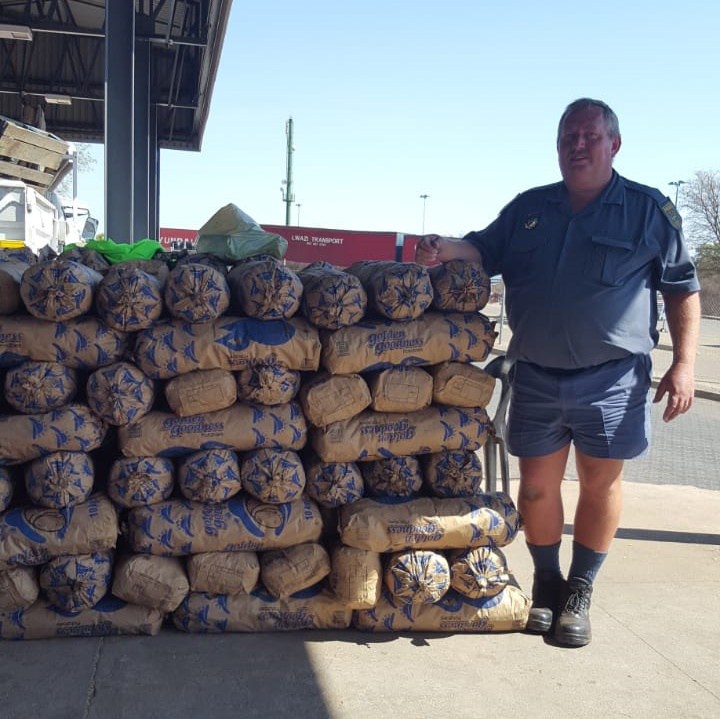This South African policeman is not posing with sacks of potatoes. Hidden away in the bags, intercepted at the South African border with Botswana early this month, are thousands of marine snails — to be more specific, their dried feet.
The bust recovered nearly 1.5 tons of abalone, a delicacy almost beyond compare in Chinese cuisine. One of the major sources of supply is South Africa’s black market, where poachers dive day and night for the shellfish and cartels contrive to smuggle it out.
In less than two decades, more than 96 million of the creatures have been poached from South African waters. This is some 15,000 every day. A video montage of each animal being levered off the rocks, at one second per cut, would run longer than three years. Crowded beds of abalone that once extended for miles along the coast have been stripped clean, their discarded shells washing up on beaches. The shells are scooped like shallow bowls, with glittering mother-of-pearl inlays. South Africans often use them as ashtrays.
In Cantonese cuisine, abalone is a dish of splendor, served at special functions and to honor guests. For more than 2,000 years it has been a marker of status, first as a mainstay of royal banquets and more recently among the middle class. With shark fin, sea cucumber and fish maw — produced from the swim bladders of certain fish — abalone is regarded one of four “marine treasures,” and premium varieties can sell for hundreds of dollars per pound. One of the most coveted species, thought to offer the best value for money, is found only off the shores of South Africa.
“The best dried abalone is Japanese — it has a texture we call ‘runny egg yolk,’ where the middle remains molten,” explained Lau Chun, a respected Hong Kong chef, when I interviewed him last year. “I can put it like this: If Japanese abalone is a Mercedes, South African is a Honda — reliable, good value.”
That may be so, but it is likely that the Honda was stolen — not by Chun, who buys all his abalone legally, but further back in the supply chain. Of roughly 5,000 tons of South African abalone imported into Hong Kong in 2016, more than 3,000 tons were supplied by poaching syndicates. Nearly 2,000 tons came from abalone farms. Less than 100 tons — or just three percent of the poached total — were harvested legally from the wild.
To hunt for abalone, crews of poachers race offshore in speedboats, often working at night to avoid patrols. Divers with scuba tanks submerge by torchlight, scouring the reefs until their air is used up. In the past, it was possible to harvest 150 pounds or more in a single dive, worth some $1,500 on the black market, but thinning stocks have made this rarer. Still, in a country with sweeping unemployment and the most severe income inequality on earth, the high price of abalone continues drawing poachers. Every few years, a diver is killed by a great white shark.
The abalone they find is removed from the shell (shucked) and gutted. What remains of the animal is chiefly its broad foot. Unless confiscated by the police, these are then cooked and dried in covert facilities that passingly resemble meth labs — gas cookers, electric heaters, giant vats — before being exported, often via neighboring African countries. (Some syndicates have developed bartering relationships with Chinese mafia groups, exchanging abalone in bulk for meth or its ingredients.) This convoluted trade route makes it easier to avoid customs inspections, although occasionally, as happened a few weeks ago, officials receive tip-offs, often from rival syndicates.
But usually the shipments make it through, reaching Hong Kong’s dried seafood market. Some abalone is forwarded to traders on the Chinese mainland or in the diaspora. In New York last year, I found South African abalone in a Chinatown food shop, selling alongside ginseng and sea cucumbers. The nuggets were lumpy and uneven in color, a hallmark of illegal cookhouses. The store owner spoke English and at first entertained my questions, but when I stuck around he grew suspicious. “You will never understand,” he told me, waving his hands. “This business is very complicated. I’m too busy to talk. Stop wasting my time.”






